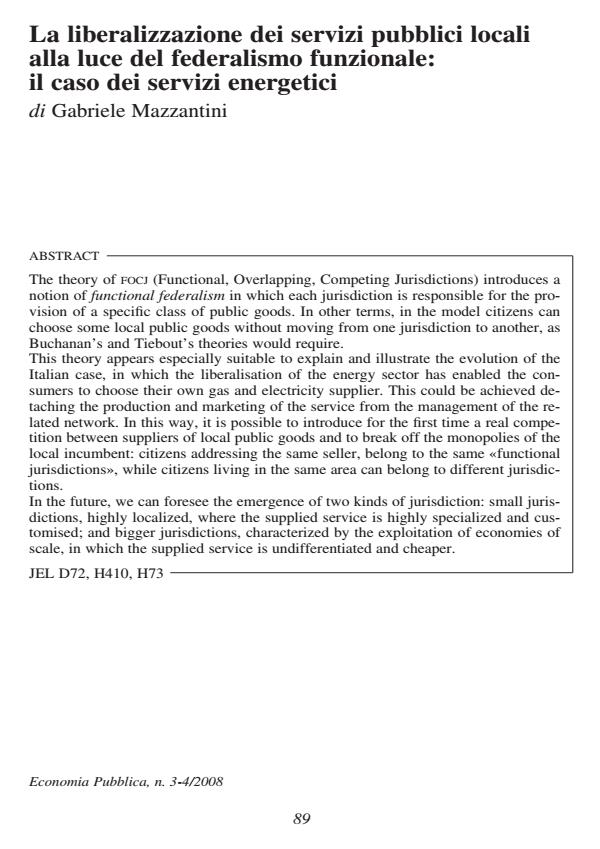La liberalizzazione dei servizi pubblici locali alla luce del federalismo funzionale: il caso dei servizi energetici
Titolo Rivista ECONOMIA PUBBLICA
Autori/Curatori Valeria Mazzantini
Anno di pubblicazione 2009 Fascicolo 2008/3-4
Lingua Italiano Numero pagine 19 P. 89-107 Dimensione file 593 KB
DOI 10.3280/EP2008-003004
Il DOI è il codice a barre della proprietà intellettuale: per saperne di più
clicca qui
Qui sotto puoi vedere in anteprima la prima pagina di questo articolo.
Se questo articolo ti interessa, lo puoi acquistare (e scaricare in formato pdf) seguendo le facili indicazioni per acquistare il download credit. Acquista Download Credits per scaricare questo Articolo in formato PDF

FrancoAngeli è membro della Publishers International Linking Association, Inc (PILA), associazione indipendente e non profit per facilitare (attraverso i servizi tecnologici implementati da CrossRef.org) l’accesso degli studiosi ai contenuti digitali nelle pubblicazioni professionali e scientifiche.
La liberalizzazione dei servizi pubblici locali alla luce del federalismo funzionale: il caso dei servizi energetici - The theory of FOCJ (Functional, Overlapping, Competing Jurisdictions) introduces a notion of functional federalism in which each jurisdiction is responsible for the provision of a specific class of public goods. In other terms, in the model citizens can choose some local public goods without moving from one jurisdiction to another, as Buchanan’s and Tiebout’s theories would require. This theory appears especially suitable to explain and illustrate the evolution of the Italian case, in which the liberalisation of the energy sector has enabled the consumers to choose their own gas and electricity supplier. This could be achieved detaching the production and marketing of the service from the management of the related network. In this way, it is possible to introduce for the first time a real competition between suppliers of local public goods and to break off the monopolies of the local incumbent: citizens addressing the same seller, belong to the same «functional jurisdictions», while citizens living in the same area can belong to different jurisdictions. In the future, we can foresee the emergence of two kinds of jurisdiction: small jurisdictions, highly localized, where the supplied service is highly specialized and customised; and bigger jurisdictions, characterized by the exploitation of economies of scale, in which the supplied service is undifferentiated and cheaper. JEL D72, H410, H73
Valeria Mazzantini, La liberalizzazione dei servizi pubblici locali alla luce del federalismo funzionale: il caso dei servizi energetici in "ECONOMIA PUBBLICA " 3-4/2008, pp 89-107, DOI: 10.3280/EP2008-003004